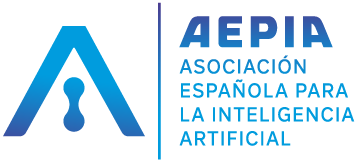Panels and Special Sessions
Throughout the conference, next to the presentation of contributed papers and a wide variety of invited talks, we'll be organising several panels and special sessions on topics that are of broad interest to members of the AI research community. Further details will be added as they become available.
50th Anniversary Session on the History of AI in Europe
The history of European AI has become a regular feature of ECAI conferences. This year's history session, curated by Luc Steels, will consist of four interventions.
First we celebrate 50 years of ECAI through a conversation between Luc Steels with Stefano Cerri about the early beginnings of EurAI, formerly known as ECCAI. Stefano Cerri was the first Secretary of ECCAI in 1982 and the General Chai of the first ECAI conference that was held under the auspices of ECCAI in Pisa in 1984.
Next we honour prominent members of the EurAI community that have left us recently. We will in particular pay tribute to Erik Sandewall, one of the earliest European pioneers of AI in the 1960s and the first Distinguished Service Award winner of EurAI in 2012. His work and significance will be commented on by Fredrik Heintz (General Chair of ECAI-2024) and we will also see an extract from the keynote lecture Erik Sandewall gave at ECAI-1988 in Munich.
The third intervention concerns a timeline of European AI being developed at the initiative of EurAI. A first proposal, elaborated at the ECAI Workshop on the History of AI in Europe held on Sunday, will be presented by Ulises Cortés and Cristian Barrué, with the goal of soliciting feedback and input from the entire EurAI community.
Finally, we will hear from the newly chosen EurAI Distinguished Service Award winners who will talk about their visions for the future development of AI in Europe, particularly in view of the current rapid developments in the deployment of Machine Learning.
Panel on the Economic Impact of AI: Threats and Opportunities
The aim of this panel will be to analyse and debate the economic impact of AI and whether and how AI will be a driver of growth and innovation. The panel will seek to provide a broad and pluralistic view of the current and expected impact of AI on the global economy, exploring both the opportunities and threats it brings. The discussion will focus on how AI is reshaping different sectors of activity, analysing economic growth forecasts, the technologies involved, differences between countries and regions, and the role of states and industry. It will also address the certainties and doubts regarding the possible emergence of an AI-based economy, in particular technological unemployment and the offshoring of jobs, as well as the concentration of wealth and power in a few companies and countries, analysing specifically the situation of Europe in this scenario. A pluralistic debate and diversity of views will be ensured, with participants coming from academia, industry, and government.
Panel on AI Regulation: The European Scenario
The aim of this panel is to analyse and discuss the European strategy for the regulation of AI and how to address the necessary supervision of AI-based systems, in particular those that may carry a higher risk. This panel will seek to explore in some detail the European strategy for the regulation of AI, with particular emphasis on the recently adopted AI Act and the AI supervision model that the EU is pushing for, comparing them with regulatory frameworks adopted in other parts of the world. The pros and cons of regulation will also be analysed, in particular as such regulation may affect innovation, competition, and the protection of citizens' rights.
Panel on the Future of AI: The Next 50 Years
After more than 50 years of scientific breakthroughs, AI is becoming mainstream. During the last decade deep learning has been the dominating paradigm. Some claim that it will be enough to achieve artificial general intelligence (AGI). Others claim that new and significantly more powerful methods are needed. But is AGI the end goal of our research, or are there better or more important long-term goals?
As a relatively young research field with broad impact outside its own field, there is also a need to mature and to develop the research culture itself. Today, many subfields of AI are driven by benchmarks. Is this the proper way to go or do we need other means of evaluating and pushing progress?
This interactive panel will explore the future of AI research. What are the major research challenges that we as a field must address? How should the field itself develop?
Panel organised by Fredrik Heintz. Panellists to be announced.
Panel on AI Conference Policies
This panel will gather representatives of organisations responsible for major international AI conferences. Panel members will discuss issues of common interest, such as conference policies, scientific communication ethics, and the use of new technologies in scientific publishing. Special attention will be given to the setting of coordination mechanisms amongst conferences. Also, the panel will address the important issue of how the academic community can help define geostrategies to integrate current AI developments into the social fabric.
Panel organised by Carles Sierra. Panellists to be announced.
Designing Ethical and Trustworthy AI Research Policies for Horizon Europe
This presentation will shed light on the EU's efforts to stimulate a human-centred and trustworthy model of AI research and development. It will focus on the European Commission's efforts to operationalise high-level ethical principles and requirements in the domain of research and to promote an ethics-by-design approach in AI research.
Special attention will be given to what is expected from applicants and beneficiaries in the context of Horizon Europe at the level of ethics appraisal of AI-related projects. This includes an analysis of the various steps of the Commission's Ethics Appraisal process, references to some best practice/reference documents, and a presentation of the Horizon Europe guidelines on algorithmic bias and fundamental rights impact assessment that are currently under development.
In addition, the challenges and the opportunities associated with the gradual implementation of the EU's AI Act will be highlighted, alongside the impact of the work of other international organisations regarding the ethics review and governance of AI research.
About the presenter: Dr. Mihalis Kritikos is a Policy Analyst at the Ethics and Integrity Sector of the European Commission, working on the ethical development of emerging technologies with a special emphasis on AI Ethics. He is also a Senior Fellow at the Brussels School of Governance (VUB) and the author of the book Ethical AI Surveillance in the Workplace (Emerald, 2023). Previously he worked for many years at the Scientific Foresight Service of the European Parliament as a legal/ethics advisor on new technologies.

















